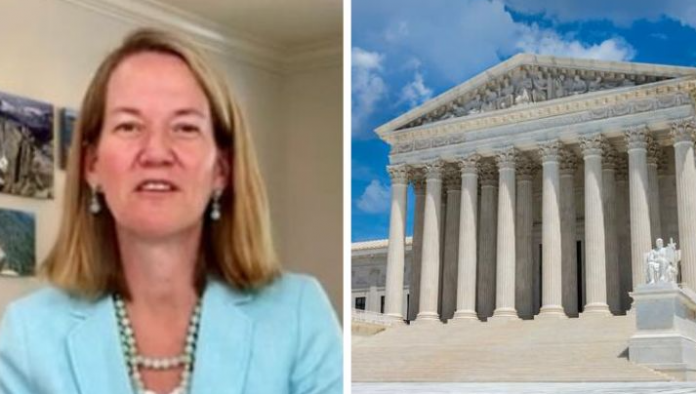In a display of resistance towards the Supreme Court’s ruling to safeguard religious freedom, Kris Mayes, the Democratic Attorney General of Arizona, declared that her office would pursue legal action against businesses that decline to serve individuals belonging to a “protected class.”
Last Friday, the Supreme Court rendered a verdict in support of Lorie Smith, a web designer from Colorado who cited her religious beliefs as the reason for declining to participate in same-sex wedding projects. With a majority vote of 6-3, the Supreme Court concluded that Smith possesses the right to refuse endorsement of a message that contradicts her beliefs, as protected by the first amendment of the US Constitution.
According to AZ Central, Mayes expressed strong opposition to the Supreme Court’s decision, characterizing it as “discriminatory” and “profoundly wrong.”
In response to the ruling, Mayes stated, “Today, a woefully misguided majority of the United States Supreme Court has decided that businesses open to the public may, in certain circumstances, discriminate against LGBTQ+ Americans. While my office is still reviewing the decision to determine its effects, I agree with Justice Sotomayor — the idea that the Constitution gives businesses the right to discriminate is ‘profoundly wrong.”
Kris Mayes, the Democrat Arizona AG who “won” her race by 280 votes over Abe Hamadeh after massive voting machine outages on Election Day, claims she will refuse to abide by Supreme Court ruling on religious freedom. https://t.co/vGqDYBIdU9
— Charlie Kirk (@charliekirk11) July 5, 2023
Additionally, the Democratic Attorney General (AG) issued a statement urging individuals who suspect they have faced discrimination by a business on the grounds of race, color, religion, or sex to come forward. Mayes clarified that Arizona’s public accommodation law forbids discrimination in places accessible to the public.
“If any Arizonan believes that they have been the victim of discrimination on the basis of race, color, religion, sex (including sexual orientation and gender identity), national origin, or ancestry in a place of public accommodation, they should file a complaint with my office. I will continue to enforce Arizona’s public accommodation law to its fullest extent.”
The Supreme Court’s ruling in the case of 303 Creative v. Elenis can be summarized as follows: Smith, the owner of 303 Creative LLC, a graphic design business, desired to expand her services to include designing wedding websites for couples. However, due to the existence of public accommodation laws similar to Arizona’s in the state of Colorado, Smith was concerned that she would be compelled, in violation of the First Amendment, to create websites celebrating marriages that she does not endorse.
Smith contended that, as a creative professional, she possesses the right to exercise free speech in the projects she chooses to engage in. In 2016, she filed a lawsuit against the state, challenging the antidiscrimination law that mandated businesses to provide services conflicting with their religious beliefs.
Justice Neil Gorsuch, in his opinion supporting Smith, stated that Colorado intended to utilize its law to coerce an individual into producing speech that goes against her beliefs. Gorsuch further emphasized that just as Smith seeks to engage in constitutionally protected First Amendment speech, Colorado endeavors to compel her to provide speech she does not wish to create.
Joining Gorsuch in the majority opinion were Justices Clarence Thomas, Samuel Alito, Amy Coney Barrett, John Roberts, and Brett Kavanaugh.
Justice Sonia Sotomayor authored the dissenting opinion, joined by Justices Elena Kagan and Ketanji Brown Jackson. In her dissent, Sotomayor noted that, for the first time in its history, the Court grants a business that is open to the public a constitutional right to refuse service to members of a protected class.








